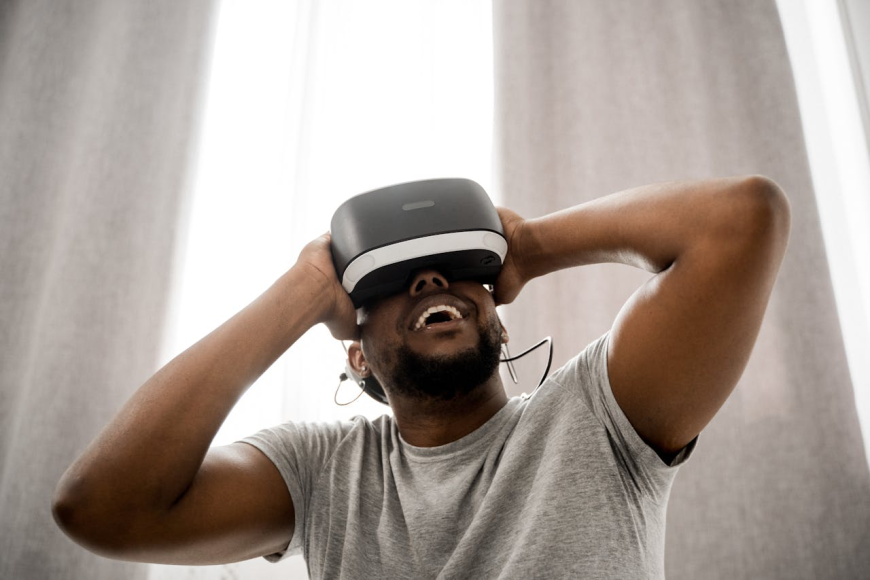Beyond Reality: Navigating the Augmented Realm
Augmented Reality (AR) isn't just some futuristic fantasy anymore. It's here, real, and taking over your favourite apps and gadgets faster. What exactly is AR?

Augmented Reality (AR) isn't just a buzzword anymore—it's the coolest tech trend turning heads and transforming how we see and interact with the world. Imagine you whip out your smartphone, point it at something ordinary, and suddenly, bam!—you're in a whole new dimension, where digital and real life collide in the most mind-blowing ways.
Understanding Augmented Reality
Okay, so what exactly is AR? Think of it as your reality, but dialled up to eleven with a sprinkle of digital magic. Unlike virtual reality, which whisks you away to entirely new worlds, AR enhances your everyday experiences by layering digital stuff—like images, videos, or funky 3D models—right onto the stuff you can touch and feel.
AR: From Sci-Fi Dreams to Everyday Awesomeness
AR isn't just some futuristic fantasy anymore—it's here, real, and taking over your favourite apps and gadgets faster than you can say "holographic unicorn." Do you remember when Pokémon GO took the world by storm? That was AR in action, turning your local park into a virtual safari zone where you could catch 'em all right alongside your friends.
But wait, there's more! Ever tried on sunglasses or tested-out furniture without leaving your couch? Thanks to AR, you can now try before you buy, whether you're decking out your virtual avatar or sprucing up your real-life living room.
The Tech Behind the Magic
Okay, let's get nerdy for a second. How does this sorcery actually work? AR works its magic through a blend of computer vision, spatial mapping, and some seriously cool sensors. These tech wonders team up to understand your surroundings, track your movements, and seamlessly merge digital delights with the real world.
Computer Vision: Computer vision algorithms analyze real-world images and videos captured by the device's cameras to identify and understand objects, surfaces, and environments. Object recognition, feature tracking, and 3D scene reconstruction are essential computer vision techniques used in AR applications.
Spatial Mapping: Spatial mapping refers to the process of using sensors and computer vision techniques to create a three-dimensional (3D) model or map of the surrounding environment in real time. This includes capturing information about surfaces, obstacles, structures, and spatial features such as walls, floors, ceilings, furniture, and other objects.
Sensory Smarts: Sensors such as accelerometers, gyroscopes, magnetometers, and depth sensors play a crucial role in tracking the device's position, orientation, and movement relative to the environment. These sensors enable accurate motion tracking and spatial mapping, essential for creating immersive AR experiences.
Applications Across Industries
The versatility of augmented reality has led to its widespread adoption across various industries, each harnessing its capabilities to innovate and streamline processes.
Retail and E-Commerce: AR is transforming the retail landscape by enabling customers to visualize products in their real environment before making a purchase. Furniture retailers, for example, offer AR apps that allow customers to see how a piece of furniture would look in their home before buying it.
Education and Training: In the education sector, AR is enhancing learning experiences by providing interactive and immersive content. Students can explore virtual models of complex concepts, such as anatomy or historical artefacts, making learning more engaging and accessible.
Healthcare: AR technology is revolutionizing healthcare by facilitating surgical planning, medical training, and patient care. Surgeons can use AR overlays during procedures to visualize internal structures in real-time, improving precision and reducing the risk of errors.
Gaming and Entertainment: AR gaming applications have gained popularity, blending digital gameplay with the real world. Games like Pokémon Go have demonstrated the potential of AR to create immersive gaming experiences that encourage physical activity and social interaction.
Architecture and Design: Architects and designers utilize AR to visualize and present their projects in a more interactive manner. Clients can walk through virtual representations of buildings or interior spaces, providing valuable insights before construction begins.
Advancements Driving AR Innovation
Hardware: Advancements in hardware, including smartphones, tablets, and AR glasses, have made AR more accessible to consumers and businesses alike. Companies like Apple and Google are investing heavily in AR-capable devices and platforms, driving innovation in hardware design and functionality.
Software and Development Tools: The availability of AR development platforms, such as ARKit (iOS) and ARCore (Android), has empowered developers to create immersive AR experiences with ease. These tools provide access to features like motion tracking, environmental understanding, and light estimation, enabling developers to build sophisticated AR applications.
Computer Vision and AI: AR relies heavily on computer vision and artificial intelligence algorithms to understand and interact with the physical environment. Advances in AI have improved object recognition, scene understanding, and gesture tracking, enhancing the realism and responsiveness of AR experiences.
Get Ready to AR-ify Your World!
So, what's next for AR? Picture this: a world where digital and physical collide in ways we've only dreamed of. From gaming and shopping to learning and exploring, AR is unlocking new dimensions of fun, creativity, and possibility.
So go ahead, dive into the AR universe, and see the world in a whole new light—where reality is just the beginning, and the only limit is your imagination.
What's Your Reaction?





























